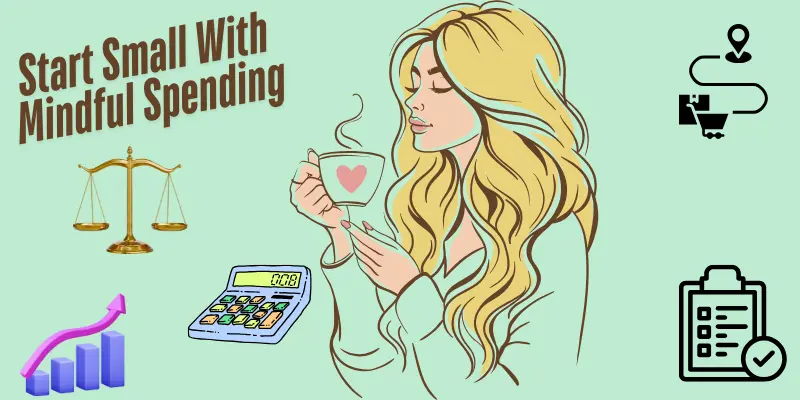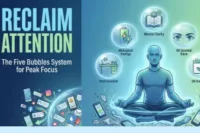7 Proven Ways to Break Free from Childhood Money Habits and Improve Your Spending
Published: 16/04/2025
It’s frustrating, isn’t it? You want to get your finances under control, but you can’t seem to break free from spending habits that have followed you throughout your life. Maybe you feel guilty every time you splurge, or you just can’t seem to save as much as you’d like.
The truth is, your childhood money habits could be behind these struggles. These early lessons can stick with you, influencing your financial decisions well into adulthood.
But don’t worry—there’s hope. The way you handle money today may be more connected to your childhood than you realize. Have you ever wondered why you always save, or why you can’t stop spending? The answer may lie in the money scripts and childhood financial lessons that have shaped your approach to money. In this post, we’ll explore 7 proven ways to break free from these old habits and take control of your financial future.
By the end, you’ll have actionable strategies that help you recognize and challenge those old patterns, set clear financial goals, and build a healthier relationship with money. Ready to stop letting your past control your finances?
Keep reading, and let’s take the first step toward financial freedom together!
Identify Your Childhood Money Scripts
Recognize the financial beliefs and habits you learned in childhood, as they deeply influence how you handle money as an adult.
Actionable Step:
Recognize the financial lessons and habits you learned as a child. These lessons shape how you think about and handle money as an adult. Identifying these ingrained beliefs is the first step in changing unhealthy financial behaviors.
- Reflect on Your Childhood Environment: Think about how your parents or caregivers managed money and how it affected you. Did they discuss money openly, or was it a taboo subject?

- Consider Key Financial Beliefs: Did your family prioritize saving or spending? Were they cautious about debt, or did they embrace credit as a tool for success?
- Assess Your Spending Behavior: Are you cautious with money due to growing up in a household that struggled financially, or do you overspend because you were taught to enjoy life at any cost?
Acknowledge the Psychological Impact
Actionable Step:
Understand how your childhood experiences and emotional connections to money influence your current financial behaviors. Recognizing these patterns is essential to making positive changes.
- Reflect on Emotional Associations: Consider the emotions tied to money in your childhood. Was money a source of security or stress?
- Notice the Impact: Did arguments or financial struggles leave you feeling anxious about your finances, or did you feel empowered by money-related lessons?
Example:
If you were taught that money was a source of stress, you may have developed a fear of managing money as an adult, possibly avoiding budgeting or financial planning because it triggers anxiety.
Money is rarely just about dollars and cents. It’s deeply connected to our emotions and early experiences. Understanding these connections is key to overcoming financial anxiety.Bethany Palmer, Certified Financial Planner and Author
Tip:
Start emotional healing by practicing self-compassion and reframing negative beliefs about money. Consider seeking professional help or using affirmations like, “Money is a tool to help me create the life I want,” to replace fear with empowerment.
Set Clear, Achievable Financial Goals
Actionable Step:
Break free from past financial habits by setting specific, measurable, and time-bound goals. Focus on savings, debt repayment, or investments to create a roadmap for financial success.
- Define Your Financial Objectives: Whether it’s saving for an emergency fund, paying off debt, or investing for the future, outline clear and achievable goals.
- Make Goals SMART: Ensure your goals are Specific, Measurable, Achievable, Relevant, and Time-bound to increase your chances of success.
Without a clear goal in mind, financial success becomes a matter of luck rather than strategy. Setting specific, measurable goals is essential for transforming your financial life.Dave Ramsey, Financial Expert
Example:
Create a step-by-step financial roadmap. For instance, set a goal to pay off $5,000 of debt in the next 12 months by allocating $400 a month, shifting your focus from scarcity to financial growth.
Start Small with Mindful Spending
Actionable Step:
Begin practicing mindful spending by making intentional, conscious choices about how you allocate your money. Focus on being aware of the impact each purchase has on your financial health.

- Track Your Purchases: Start by budgeting for small purchases (like coffee, snacks, or impulse buys) with full awareness of how they affect your overall budget.
- Evaluate Needs vs. Wants: Consider whether each expense aligns with your financial goals and priorities, focusing on intentional spending.
Small changes, when practiced consistently, have a big impact on our financial well-being. Mindful spending is about making intentional decisions with your money—one choice at a time.Suze Orman, Personal Finance Expert
Example:
Start with something simple, like budgeting $50 a month for entertainment, and consciously choose where to spend that money. This will help you see how small, intentional purchases can align with your larger financial goals.
Tip:
Encourage readers to use a spending tracker app to help monitor and categorize expenses. This tool can boost financial awareness and guide better spending decisions over time.
Challenge and Reframe Negative Beliefs
Actionable Step:
Change your negative money scripts (e.g., “Money is the root of all evil”) by actively challenging and reframing those beliefs to create a healthier financial mindset.
- Identify Limiting Beliefs: Recognize negative beliefs about money that may be holding you back, such as scarcity mindset or fear of success.
- Reframe Your Thoughts: Replace these limiting beliefs with empowering statements that encourage abundance and financial growth.
Example:
Practice saying affirmations like, “Money is a tool that allows me to achieve my goals,” to shift your mindset from scarcity to abundance.
Practical Advice:
Suggest daily mindset exercises, such as writing down three positive things about money every day, to help reprogram your thoughts and move towards abundance thinking.
Create a Balanced Budget that Reflects Your Values
Actionable Step:
Develop a budget that aligns with your values and long-term goals instead of relying on old money habits or feelings of guilt about spending.
- Focus on What Matters: Prioritize spending that supports your core values (e.g., security, family, or personal growth) and aligns with your long-term financial objectives.
- Incorporate Flexibility: Avoid a restrictive budget by allowing room for personal enjoyment within a healthy financial framework.
Example:
If you were raised with the belief that spending is bad, consider budgeting a set amount for leisure activities or self-care to create balance and avoid burnout while still staying on track financially.
Tip:
Provide a budget template that includes sections for both savings and personal enjoyment, ensuring a balanced approach to money that doesn’t neglect either savings or quality of life.
Build Financial Literacy and Confidence
Actionable Step:
Educate yourself about personal finance to overcome any fear or confusion surrounding money, empowering you to make informed financial decisions.
- Start Small: Take small steps to improve your financial knowledge, such as reading personal finance books, watching educational videos, or listening to podcasts.
- Focus on Key Concepts: Learn the basics of budgeting, investing, saving, and debt management to build a solid financial foundation.
Example:
Start by reading a book like “The Total Money Makeover” by Dave Ramsey, or watch YouTube videos on basic investing strategies to enhance your understanding.
Recommend credible financial resources to help improve financial literacy, such as:
- Books: “The Millionaire Next Door” by Thomas J. Stanley and William D. Danko
- Podcasts: The Dave Ramsey Show or BiggerPockets Podcast
- Blogs: The Simple Dollar or NerdWallet
Conclusion
In conclusion, understanding how your childhood money habits have shaped your current financial behaviors is the first step toward making positive changes. By recognizing your money scripts and taking actionable steps, you can break free from old habits that no longer serve your financial goals.
Key Takeaways:
By identifying your childhood money habits and implementing these 7 proven strategies, you can break free from old financial behaviors and create a healthier relationship with money. Start small, be mindful, and remember that making gradual changes will lead to long-term improvement.
Take Action Today:
The power to transform your financial life is in your hands. Whether it’s setting new financial goals, challenging negative beliefs, or practicing mindful spending, each small step brings you closer to a better financial future. Take a moment to reflect on the money habits you learned growing up, and start applying these strategies to shift your mindset.
Our beliefs about money are often formed before the age of seven. Recognizing those early scripts is the first step in rewriting them.Dr. Brad Klontz, a financial psychologist and author
What’s Your Next Step?
How will you begin to reshape your financial future? Share your thoughts and journey in the comments below—let’s keep the conversation going!
FAQs: Understanding and Transforming Childhood Money Habits
Childhood experiences, such as witnessing financial stress or being taught that money is scarce, can lead to fears or unhealthy relationships with money in adulthood, affecting your spending habits.
Practice affirmations like, “Money is a tool to help me achieve my goals.” Challenge beliefs like “money is the root of all evil” and replace them with healthier, positive perspectives.
Start small by educating yourself, setting achievable financial goals, and practicing mindful spending. Over time, as you build knowledge and confidence, the fear will lessen.
Understanding these scripts allows you to see how past experiences influence your current financial decisions. It helps you break free from harmful patterns and align your spending with your values.
Yes! Teaching kids how to budget, save, and make smart financial choices early on can help them build positive habits that last into adulthood.
There are four types of money scripts: Money Avoidance, Money Worship, Money Status, and Money Vigilance. Each one shapes how you think and act with money in different ways.
Yes! By becoming aware of these old habits and beliefs, you can change them. It takes practice, but you can learn to make better financial decisions.

- Be Respectful
- Stay Relevant
- Stay Positive
- True Feedback
- Encourage Discussion
- Avoid Spamming
- No Fake News
- Don't Copy-Paste
- No Personal Attacks

- Be Respectful
- Stay Relevant
- Stay Positive
- True Feedback
- Encourage Discussion
- Avoid Spamming
- No Fake News
- Don't Copy-Paste
- No Personal Attacks





